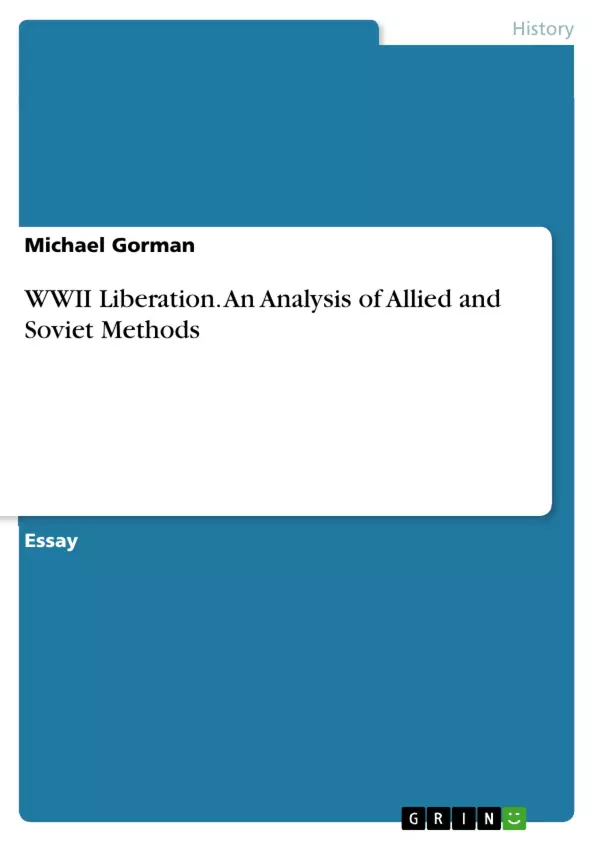The contrasts between Allied and Soviet styles of liberation in the Second World War are most apparent, on the surface, when one takes a look at the split of Berlin, but to fully comprehend these styles, one must regard other areas of Liberation, understand the foreign policy of the time, and look through the eyes of the liberators as well as the liberated.
This independent study did just that. The destinations that were investigated include the Allied-liberated capital of France, Paris, the Allied-landing point in France, Normandy, and the main Allied headquarters and capital, London, United Kingdom. The main site for investigating Soviet liberation of Nazi-occupied territories was Prague, in the Czech Republic.
This investigation also incorporated surveys and interviews from natives of these locations about their beliefs and the beliefs of the older generation on the subject of liberation. By looking back at the liberation of the east and west, one could better comprehend the modern political ideologies and socio-economic environment of Europe.
Inhaltsverzeichnis (Table of Contents)
- Allied and Soviet Liberation Methods in WWII
- Allied Liberation in France
- Allied Liberation in Normandy
- Soviet Liberation in Prague
Zielsetzung und Themenschwerpunkte (Objectives and Key Themes)
This independent study examines the contrasting styles of liberation employed by Allied and Soviet forces during World War II. It explores the motivations, objectives, and outcomes of these liberations, considering both the perspectives of the liberators and the liberated. The study focuses on specific locations, including Paris, Normandy, London, and Prague, to provide a detailed analysis of the distinct approaches to liberation.
- The impact of Game Theory on Allied liberation strategies
- The role of the Marshall Plan in shaping post-war Europe
- The contrasting experiences of liberation in Allied and Soviet-occupied territories
- The lasting consequences of the Cold War on European politics and society
- The significance of public opinion and historical memory in understanding the legacy of liberation
Zusammenfassung der Kapitel (Chapter Summaries)
This study delves into the complexities of liberation in World War II by examining specific case studies. The first chapter focuses on the Allied liberation of Paris, exploring the city's historical significance, key events, and the lasting impact of the liberation on French society. The second chapter examines the Allied liberation of Normandy, analyzing the strategic importance of the D-Day landings, the role of various Allied forces, and the challenges faced by the liberators. The third chapter explores the Soviet liberation of Prague, focusing on the political and social context of the liberation, the experiences of the Czech people, and the long-term consequences of Soviet rule. The final chapter concludes by synthesizing the findings of the study, highlighting the key differences between Allied and Soviet liberation methods, and examining the enduring legacies of both.
Schlüsselwörter (Keywords)
This study focuses on the contrasting approaches to liberation employed by Allied and Soviet forces during World War II. Key themes include the impact of Game Theory on Allied strategies, the Marshall Plan's role in shaping post-war Europe, the contrasting experiences of liberation in Allied and Soviet-occupied territories, and the lasting consequences of the Cold War on European politics and society. The study also examines public opinion and historical memory as essential elements in understanding the legacy of liberation.
- Quote paper
- Michael Gorman (Author), 2014, WWII Liberation. An Analysis of Allied and Soviet Methods, Munich, GRIN Verlag, https://www.hausarbeiten.de/document/323315


